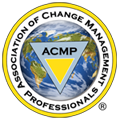On April 11th, Vanessa Simpson and Heather Lehmann hosted the first of a new event series called ACMP Tool Time: Bringing the ACMP Standards to Life! at the Creekside Community Centre in Vancouver. This new series is focused on interactive & collaborative learning where attendees learn about, share, and discuss various tools, processes, and/or assessments that support a specific phase in change projects, using the ACMP Standard as our guide.
This first session was focused on the topic “Evaluating Change Impact and Organizational Readiness”. This initial step in the change process includes processes to “assess, evaluate, and anticipate an organization and its stakeholders’ readiness, ability, and capacity to undergo a transition from the current state to a future state” as well as “an assessment of the change and the impact the change will have on the individual and organization.” Given the breadth of this subject, the focus was on sample tools related to assessing stakeholder impact; answering the fundamental questions of who’s impacted by this change and how big is it for them.
Below are the highlights from the discussion about the stakeholder impact assessment tool examples that were shared:
- The stakeholder impact assessment is a key input to communications and training planning, as well as risk and opportunity identification
- A vision statement workshop could be conducted first before the stakeholder impact assessment
- In addition to the tool to record answers, it can be helpful to include a list of stakeholder interview questions
- It should constantly be reviewed and updated as the project progresses (consider a mechanism of tracking changes to the content as you update it!)
- Sponsors play an important role in introducing and advocating for change management to stakeholders, and the impact assessment can help ensure alignment on the approach
- One of the benefits of the stakeholder impact assessment is how it can bring to light the differences in perspective in roles, from the sponsor to the stakeholder to the manager
- It’s an excellent tool for guiding the conversation with sponsors and other stakeholders
- Keep the tool simple but flexible to be able to incorporate different sources of data, depending on the type of project / industry that you are working with
- Carefully consider who and how you will share the outputs of the information collected – there may be confidential or sensitive information that you have gathered!
We’ve heard positive feedback about the workshop style of this event focused on learning and sharing, and look forward to hosting another soon – check out our Events page for the most up-to-date listing of our events! Many thanks to Vanessa Simpson, Heather Lehmann and Jen Olson Lund for spearheading this series!


